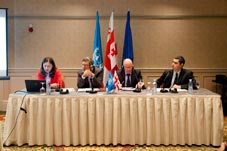Media monitoring to extend into 2013
By Etuna Tsotniashvili
Thursday, April 26

In addition to national television and press, monitoring will cover radio and online media resources. The new round of monitoring will be implemented by the Caucasus Research Resource Centre, the International Society for Fair Elections and Democracy, Internews Georgia, and the Georgian Institute of Public Affairs. At the same time, the Georgian Public Broadcaster will allocate time to the program Media Monitor, where monitoring results and processes will be discussed.
Speaking at the meeting, Ambassador Philip Dimitrov, Head of the EU Delegation to Georgia reiterated that the EU will continue to assist the efforts of civil society in Georgia to monitor and analyse the media and inform the public about its performance. He noted that during elections it is very important that monitoring is fair and accurate, to ensure that there are no abuses or challenges.
"Elections are a controversial thing. In elections there are always winners and losers, which means election culture should be enhanced by hoping people play fairly, so that winning and losing make sense – and of course, [sides are] ready to accept the results. It is very difficult to achieve it if you do not have a feeling and perception that people are well-informed, that people are well-accessed, there are no voices pushed down, and that there is no opportunity taken away from those who want to express their positions," Dimitrov said.
The EU Ambassador also commented on the importance of making clear what the democratic standards are, and to assure that they are met. "Of course, media is often biased, no surprise. Of course, those who are developing their ideas, those who are taking part in competition are trying to take advantage everywhere... Our desire is to see Georgia democratic, Georgia prosperous and Georgia developing in a way which we consider proper. This is why the voice of international institution representatives in Georgia will be the ultimate signal of how things are going in the country," he maintained.
Speaking to The Messenger, Jamie McGoldrick, UNDP Resident Representative in Georgia said that the media monitoring during 2010 municipal elections was very successful in terms of getting media to look at itself and its performance.
“Media monitoring enhances the links between the media and society, and helps the public make informed decisions. If media can shape a society, then credible and unbiased monitoring can shape the media,” McGoldrick noted.
"I think the media has to understand the obligations that they have as the Fifth Estate in any society. The more professional, the more vibrant, the well-placed, the more objective they are, the more impartial they are, then the better society performs and the better democracy performs. I think a litmus test for democracy that you've got in any country, is a professional media well-performing," he maintained.
At the meeting, EU and UNDP representatives also reported on the results of media monitoring for 2011. This previous monitoring of the Georgian media was carried out from June through December 2011, and examined the coverage of social and economic issues, including the judiciary, civil society, local governance, internally displaced persons, persons with disabilities, gender-based violence, minorities, under-aged victims and juveniles in conflict with the law, environmental and social issues, and elections. It was implemented by the Caucasus Research Resource Centre, the Georgian Institute of Public Affairs, the Civil Society Institute, the Civic Development Institute, the Human Rights Centre, the International Society for Fair Elections and Democracy, and Internews Georgia.
According to the monitoring results, television channels in Georgia take on various strategies for election coverage. TV Kavkasia and Maestro TV allotted the largest amount of time to election issues, with a relatively negative tone towards the government administration. The Public Broadcaster aired a very limited amount of information; however it had the most correct and balanced information. Rustavi 2 and Imedi allocated the least amount of time to election issues.
The aim of the EU and UNDP initiative is to contribute to the development of strong and independent public broadcasting in Georgia and the creation of a transparent, objective, and balanced media environment. The cost of the project is approximate Euro 450 000.
